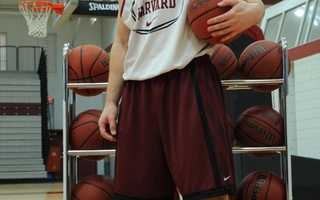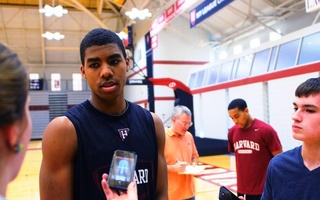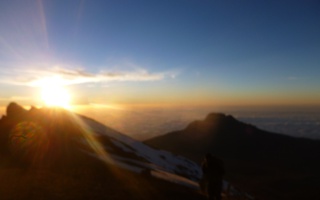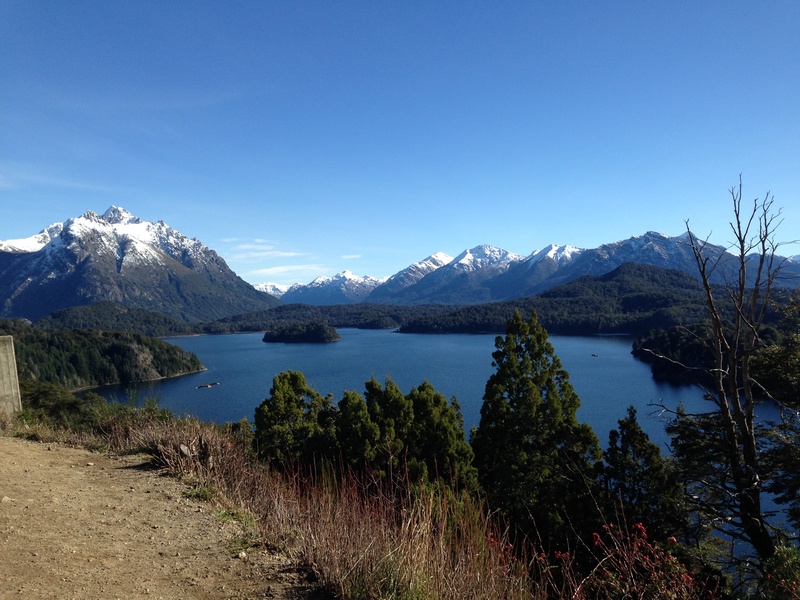BARILOCHE, Argentina—Sometimes you have to climb a mountain to really see where you are in the world.
“I think we’re almost to the panoramic point,” I tell my friend, gesturing over my bike to a turn-off further up along the universe’s most arduous hill.
It is, in fact, not the panoramic point. So we press onward and upward, trailed by a string of raggedy dogs. “There’s always gonna be/ Another mountain,” I think to myself as I ride. “Always gonna be an uphill/ Battle.” Miley Cyrus, no matter how much you twerk, you are privy to some certain truths.
I’m not really sure why these dogs are following us, but a dog is the most loyal and trustworthy friend there is, so whatever. Also the white boxer and the one that looks like a sheep are biting each other again.
As an American abroad, I have learned many things on my journey up the mountain of cultural discovery. I have learned not to expect that other cultures will share my customs. For example, this dog does not know that it is rude to run growling front of my bike, nipping at my heels. I consider gently explaining to him that this is not how things in done in our country, but in the end I check my privilege and pedal onward. Sigh.
At the panoramic point, eating cheesy bread, I discover the dogs have abandoned us. Another milestone on the route of becoming a global citizen: Careful whom you trust.
Not to be deterred, we brave adventurers embark once more and soon encounter a formidable obstacle: the universe’s most arduous climb (but for real this time). I am starting to decide that life is a series of uphill struggles, including hills that look deceivingly flat at meter zero, but that suck the life and soul out of you when you actually get going.
“Almost there! You can do it!” says my traveling companion (that would be one Alana I. Ganz ’15, my ever-encouraging and much-more-fit friend whose brown hair is flowing in the wind). Sometimes it’s no pain, no gain. This doesn’t appear to be one of those sometimes, however. I jump off and join a line of Brazilians walking their bikes up the hill.
I realize I was wrong, life is in fact like a series of uphill struggles punctuated with panoramic points. We have reached yet another one, and I am fixing my hair for a Facebook photo shoot while gazing out at the crystal clear lake. Up here, breathing in the fresh mountain air, I feel my perspective shifting.
I swing my gaze to a man nearing my bicycle, and though I have learned in my time abroad that other cultures are great, I’ll be hot-damned if I let some dude run off with my bike. I abandon the vista to stand guard.
The rest of the day is a blur. However, through the sweaty film coating my eyes, I do recall seeing some giant dinosaur statues, and an Argentine who learned English listening to Blink 182 and Green Day—and selfies, lots of selfies.
On the bus back to the city, after hours spent subiendo and bajando (as they say it here—one must always attempt to adopt the behaviors of the host population; when in Argentina, do as the Argentines!) the beautiful lakeside hills of Bariloche, we drag our exhausted bodies onto the bus. But no! The conductor is telling us we don’t have enough bus fare on our cards! We glance around, helpless and naïve in this vast mundo. (You should really know that one.)
Then a voice behind us is offering his bus card. I try to pay him back, but he says something in Portuguese I do not understand and shoves me away.
I realize that the random kindness of strangers is something that you can find anywhere in the world. I realize that actually we are maybe not that different after all. I realize that I probably should have calculated how much money to put on my bus card and also that this man will enjoy a long laugh with his grandkids about these stupid Americans he saved from certain death in front of a luxury hotel.
There’s probably a lesson somewhere in all of this, which I promise to share, once these five Advil and that little something extra kick in.
Julia F. P. Ostmann ’15, a Crimson magazine editor, is a history and science concentrator living in Quincy House.
Read more in Opinion
Hard RealitiesRecommended Articles
-
 Lehigh's Second-Half Comeback Dooms Harvard Football
Lehigh's Second-Half Comeback Dooms Harvard Football -
 Stroke of Genius
Stroke of Genius -
Coordinates: On Country RoadsI can’t explain why I always want to cry every goddamn time I hear John Denver’s “Take Me Home, Country Roads.” It’s just a camp thing.
-
 Does Harvard have a shot? New Mexico
Does Harvard have a shot? New Mexico -
 Lobos Poised To Break Through To Sweet Sixteen
Lobos Poised To Break Through To Sweet Sixteen -
 Under the Sea
Under the Sea














